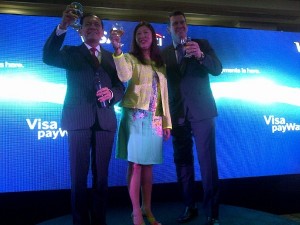Iain Jamieson, Visa country manager for Philippines and Guam, discusses the benefits of contactless credit-card payment technology offered by Citibank and Visa dubbed “Citibank Visa payWave”. Video by INQUIRER.net/Matikas Santos
MANILA, Philippines—Say goodbye to long lines at cashiers who are asking for a smaller bill or asking for coins when buying groceries at supermarkets, drinks at coffee shops, and tickets to the movies.
Citibank and Visa launched Thursday their new contactless credit card payment technology dubbed “Citibank Visa payWave” that enables cardholders to make purchases simply by waving their card.
“Today’s launch of Visa payWave marks a tremendous step forward in transforming the Philippines into a modern, cashless society,” Iain Jamieson, Visa country manager for Philippines and Guam, said during the launch.
“Time is the most valuable asset for busy Filipino cardholders who no longer have to wait in long queues or fumble with cash or coins,” he said.
The Visa payWave is already accepted at several commercial establishments such as Coffee Bean and Tea Leaf, Mercury Drug, Robinson’s Supermarket, Eastwood and Lucky China Cinemas. It will be accepted soon at Newport Cinemas and McDonald’s.

Iain Jamieson, Visa country manager for Philippines and Guam (right) shares a toast with Batara Sianturi, Citi Country Officer (left) and Bea Tan, Consumer Business Manager (Center), to celebrate the launch of the Citibank Visa payWave contactless credit card in the Philippines. MATIKAS SANTOS
The contactless payment system is expected to further reduce the long lines at cashiers since cardholders no longer need to sign for transactions below P2000. Higher value transactions require either a signature or entering a Personal Identification Number.
Visa and Citibank assured that the new contactless technology is safe from cloning, accidentally being read by card terminals and double payments.
Cards that are already equipped with the contactless technology may still be used at traditional swipe terminals.
Cardholders can get the new payWave card as replacement when their current card expires or if they request for it.
Jamieson said that several developed countries in Europe already have this technology and it is expanding in several developing countries in Asia.
“Most of the Countries in Europe now accept it, even counties as big as the United States are now piloting this technology. In Asia, Singapore, Malaysia, Thailand have the technology [and] It’s been in play in places like Korea and Japan for a long time,” Jamieson said.
“The biggest most successful markets now are Australia and New Zealand where in two years ago they deployed the technology and within that space of two years, 30 percent of all transactions in Australia are now through payWave cards,” he said.
The payWave cards are being seen as a new form of payment especially for establishments that don’t traditionally accept card payments.
“McDonalds used to not take cards in any way, shape, or form, over the counter. As of November, they will now be accepting cards as a payment form because the payWave has brought them the speed and the convenience in the checkout that they require,” Jamieson said.
The new contactless credit card payment will likely move on to different form factors such as being placed at the back of mobile phones or integrated into the phone itself.
“In the next year or so you’re going to see this technology move on to the mobile phone, so I think you will have mobile phones that will have contactless technology within the actual phone themselves, or a sticker at the back of the phone that is a small representation of your card,” Jamieson said.


